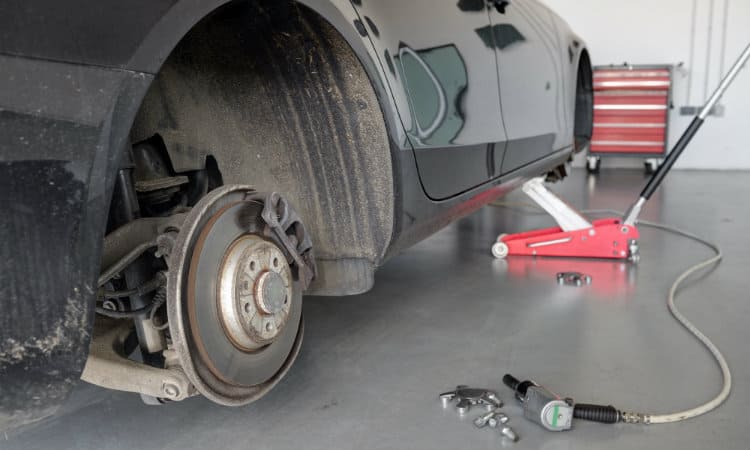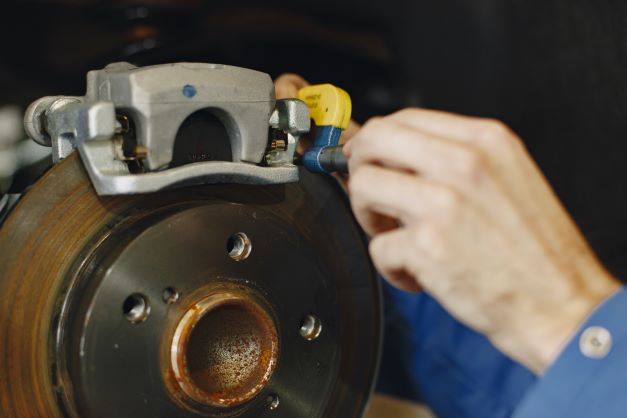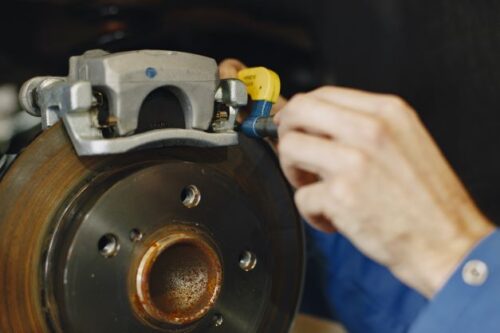Hearing a squealing or squeaking sound coming from your brakes occasionally–and for a short time–can be a fairly normal occurrence.
Hearing a constant grinding noise coming from your brakes is not normal, and should be investigated sooner rather than later. That sound is likely telling you that brake service is required now. Here are some of the possible causes of the grinding, and what you can do to fix them.

6 Causes of Grinding Brakes
Almost everyone with a vehicle will have grinding noises coming from their brakes at some time. These are some of the items to look at when it happens to you.
1) Worn Out or Damaged Brake Pads
Brake pads are the first thing that comes to people’s minds when the brakes start grinding. With good reason. Most of the time they are the culprit.
Most manufacturers recommend changing brake pads between 40,000 and 50,000 miles. This depends a lot on your driving habits and where you drive. Check your owners manual for their recommendations.
New brake pads are 12 millimeters thick. If you are a visual person, the pads will be ready to change when 3 or 4 millimeters thick. Most brake pads are equipped with small metal tabs at the 3 millimeter depth that will start rubbing against the disk when pads are worn down. They will make a constant or intermittent squealing noise. If you change brake pads right then, you might save yourself the cost of re-facing the rotors or buying new rotors. The longer you wait, the more noise you have to put up with, and the more cost.
Even if the rotors are scored, they can probably be turned (ground smooth) if you change brake pads early. Wait until you are hearing the grinding and screaming of metal on metal and you are probably replacing the rotors.
Note: If you wait until the pad is gone you will have metal to metal contact. Which will heat the rotor, and possibly warp it. At that point, it cannot be salvaged and you will need new rotors.
2) Debris – in the Caliper or the Rock Guard
If you hear a continuous grinding or squealing sound coming from a brake, there is a good chance that some foreign object is lodged in the caliper. It could be a small stone, pebble, or sand. With any luck, it will fall out, wear out, or break up within a day. You can try to help it along by moving forward and backward a couple of feet at a time. Preferably in your driveway or a parking lot.
Another place that has an affinity for small stones is the rock guard (or splash shield). This is the pan on the back side of the rotor to protect it from water and stones. (The only thing the ones on my Dodge protect are the stones that get lodged in the thing.)
If you cannot remove whatever is in there, you should take it to a professional. Leaving a foreign object in the braking system can eventually cause some damage. Damaged calipers or rotors are way more expensive than having a rock removed.
3) Rust and Corrosion
Brake rotors are nice clean shiny steel rust magnets. Especially when the air is humid, it takes no time for them to begin rusting. Rotors may develop enough rust overnight to be noisy first thing in the morning. If the vehicle sits for days or even weeks the rotors will get a good layer of rust on them, and be quite noisy when you first start driving. This is not a big deal and will wear off and quiet down quickly.
All of the other moving brake parts will also get corroded or rusty. They are not self-cleaning like rotors. Please see 6) Lubricate the Brake System for information on how to keep parts quiet and working well.
4) Technology – Anti Lock Braking Systems
Anti lock braking systems work by electronically pumping your brakes. This action helps you keep control (and even be able to steer) when the brakes are applied aggressively. That is the good part. The bad part is that you will hear a grinding noise while the brake is being applied.
The noise will quit as soon as you release the brake pedal.
5) Worn Rotor
Don’t be this person. The brakes are grinding. I will drive a little longer. The pads are shot. The rotors are scarred and grooved. I will save money by only replacing pads. The new pads are scarred and grooved. And making grinding noises.
Disc brakes are designed to have the pads ride against the discs at all times. New smooth brake pads and new smooth rotors should stay that way. Unfortunately, dust, dirt, even small bits of gravel will get lodged between pads and rotors and can scar the rotors badly. The snug fit between rotor and pad prevents debris from falling out. It usually gets worn away first.
Also, buying cheap brake pads which have more metal in their construction, increases the chance of scraping and grinding noise. More metal means more damage to the rotor.
6) Lubricate the Braking System
No, I am not suggesting that you lubricate brake pads or discs. (Although they would be much quieter. Wouldn’t stop the vehicle, but . . .) Rusted caliper bolts are quite often the cause of the grinding noise when braking.
Anything on your braking system that slides or moves requires lubrication. These include caliper slides, pins, bushings, self-adjusting mechanisms, contact points where the pads slide, and even parking brake cables. Everything down there spends a good part of its life getting wet, dusty, muddy, snowy, and ignored.
Make sure you get a silicone-based lube that is specifically for brakes. Clean everything you are going to lube with brake cleaner, a small file to remove rust, more brake cleaner, and soft clean cloths. Apply the lube by putting a little on the tip of your finger. Use sparingly.
Do Not Get Lubricant on the Rotors! Going to all that work to find out you can’t stop is not good.
Miscellaneous Brake Noises
There are a few other things that could be making noise when you are braking.
- Wheel Bearings. I know that bearings are not brakes, but they can make the same noises in the same locations. There is a real good chance that your wheel bearings are going to last 100,000 miles. But if, or when, they start wearing out, the noise and vehicle reaction will resemble a brake problem. Knocking, grinding, squealing. When you or your mechanic have the wheels off to inspect the brake system, make sure you check the wheel bearings also. For more information please see our article Why is My Car Making a Knocking Noise?
- Low-Quality Brake Pads. Everyone likes a deal. But buying cheap brake pads may be a case of short-term gain for long-term pain. Generally, cheap brake pads are of lower quality, have more metal in them, and have been known to break apart under certain conditions. They will not last as long and there is a good chance they will cause more rotor damage.
Is it Safe to Drive When My Brakes are Grinding?
Probably at a reduced speed and for a short distance–to home or a mechanic shop. Having to slam on the brakes with pads falling apart, or calipers not working properly is dangerous.
Also, the longer you drive with grinding brakes, the more likely it will cost more to repair.

DIY or Mechanic?
None of this work is horribly difficult for a person with some mechanical experience. And the internet is full of all kinds of information and ‘How to’ videos. But if you tend to be better at sales or accounting, and have any doubts about taking on a brake project, you are probably better off taking your vehicle to a brake shop or mechanic.
The safety of you, your passengers, and other drivers and pedestrians depends on the brakes in your vehicle working well.

